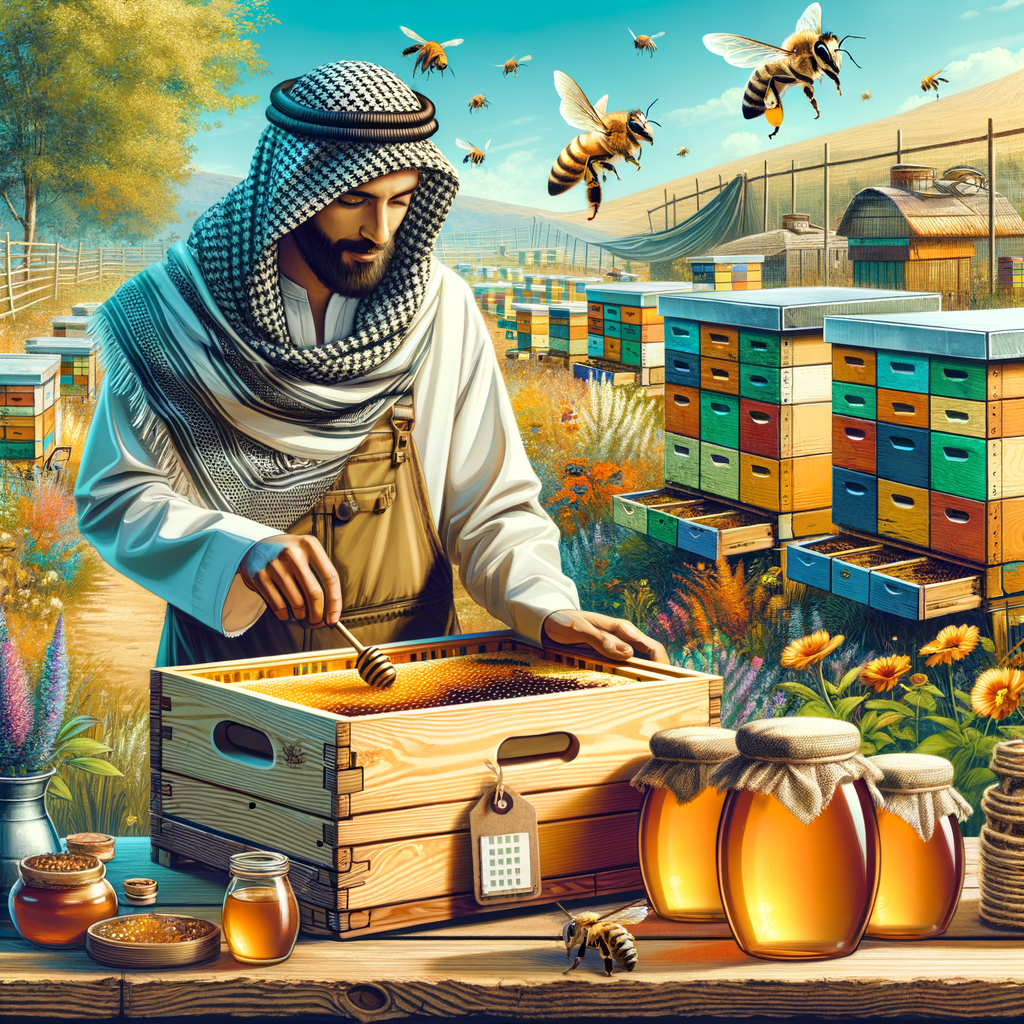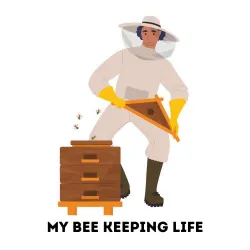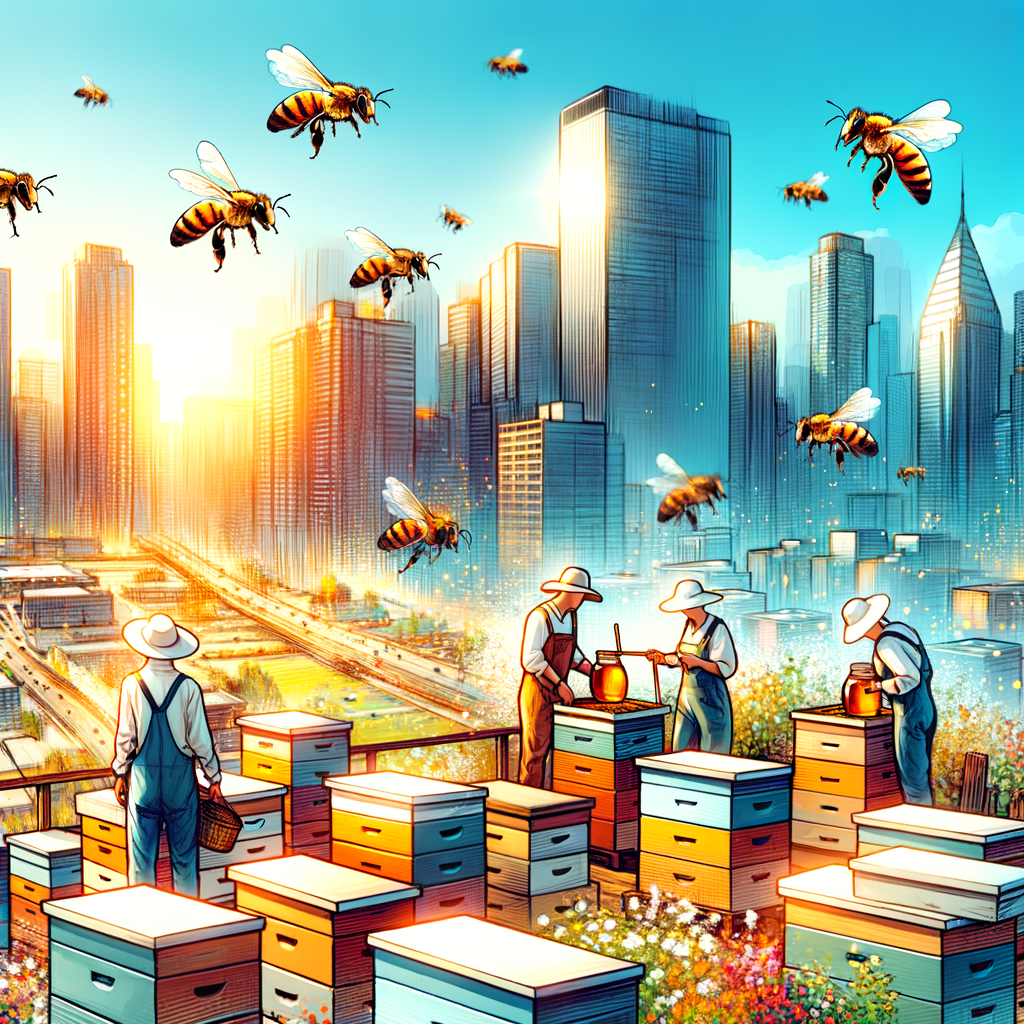
Introduction to Local Beekeeping Businesses
Local beekeeping businesses play a crucial role in our communities and ecosystems. Not only do they produce delicious honey, but they also help to pollinate our plants, contributing to biodiversity and the health of our environment. This introduction will help you understand the importance of these businesses and why we should support them.
- Understanding the role of local beekeeping businesses
- The importance of supporting local beekeepers
Local beekeeping businesses are often small, family-run operations that focus on the production of honey and other bee-related products. They are responsible for maintaining healthy bee populations, which are essential for pollinating plants in our gardens, parks, and farms. Without these businesses, our local ecosystems could suffer, as bees play a vital role in plant reproduction. In fact, according to the United States Department of Agriculture, bees help to pollinate approximately 75% of the fruits, nuts, and vegetables grown in the United States.
Supporting local beekeepers is not just about buying local honey. It’s about contributing to a sustainable local economy and promoting biodiversity in our environment. When we buy from local beekeepers, we are helping to keep their businesses alive and thriving. This, in turn, allows them to continue their important work of maintaining healthy bee populations. Additionally, local honey is often of higher quality than mass-produced varieties, as it is usually raw and unfiltered, preserving all the beneficial nutrients and enzymes.
In conclusion, local beekeeping businesses are an essential part of our communities. They contribute to our local economies, promote biodiversity, and produce high-quality honey. By understanding their role and importance, we can make informed choices to support them and contribute to a healthier, more sustainable world.
Local Honey Production
Local honey production is an essential part of our community. It’s not just about the sweet, golden liquid that we all love. It’s about supporting local businesses, promoting sustainable practices, and maintaining the health of our local bee populations. Let’s delve into the fascinating process of local honey production.
Process of Local Honey Production
The process of local honey production is a fascinating journey that involves hard work from our tiny friends, the honey bees. It’s a three-step process that includes the collection of nectar, the conversion of nectar into honey, and the extraction and bottling of honey.
- Collection of Nectar by Honey Bees
- Conversion of Nectar into Honey
- Extraction and Bottling of Honey
The journey of honey production begins when worker bees leave the hive in search of flowers. They collect nectar, a sweet liquid produced by flowers, using their long, tube-shaped tongues and store it in their ‘honey stomachs’. Did you know a bee may visit up to 100 flowers during a single collection trip?
Once the worker bee returns to the hive, it passes the nectar to a hive bee. The hive bee then begins the process of converting the nectar into honey. This is done by chewing the nectar for about half an hour. During this time, enzymes in the bee’s saliva break down the complex sugars in the nectar into simpler ones. This process is what gives honey its long shelf life.
The final step in the process is the extraction and bottling of honey. Once the nectar has been fully converted into honey, the bees seal the honeycomb with a layer of wax. Beekeepers then collect these honeycombs and place them in a machine called a centrifuge, which spins the honeycombs and forces out the honey. The honey is then strained to remove any remaining wax and debris before it is bottled and ready for you to enjoy.
Local honey production is a remarkable process that showcases the hard work and dedication of both honey bees and local beekeepers. By supporting local honey production, we are not only enjoying a delicious and natural product, but we are also contributing to the sustainability and health of our local environment and economy.
Benefits of Local Honey Products
Local honey products offer a myriad of benefits, both for our health and the environment. Let’s delve into these advantages:
- Health benefits of consuming local honey
Local honey is a treasure trove of health benefits. It’s packed with essential nutrients, antioxidants, and natural enzymes that can boost your overall health. Here are some of the key health benefits of consuming local honey:
- Natural Energy Source: Honey is a natural source of carbohydrates, providing 17 grams per tablespoon. This makes it ideal for your morning toast or as an energy boost during your afternoon slump.
- Antioxidant-Rich: Local honey contains antioxidants like phenols, enzymes, and compounds like flavonoids and organic acids. Antioxidants help to protect your body from cell damage due to free radicals.
- Supports Digestive Health: Honey can help with digestive issues like diarrhea, and it can soothe acid reflux or a digestion-related sore throat.
- Helps with Allergies: Consuming local honey can help acclimate your body to the pollen of that area, potentially reducing your seasonal allergy symptoms.
- Environmental benefits of supporting local honey production
Supporting local honey production goes beyond personal health benefits. It also contributes significantly to environmental sustainability. Here’s how:
- Promotes Biodiversity: Bees play a crucial role in pollinating many of the plants that make up the world’s food supply. By supporting local honey production, you’re helping to maintain and increase bee populations, promoting biodiversity.
- Supports Local Economy: When you buy local honey, you’re supporting local beekeepers and your local economy. This helps to keep money within your community and supports jobs for local residents.
- Reduces Carbon Footprint: Local honey doesn’t have to travel far to reach your table, reducing its carbon footprint compared to honey shipped from other regions or countries.
In conclusion, local honey is not just a sweet treat. It’s a powerhouse of health benefits and a champion of environmental sustainability. So, the next time you need to sweeten your tea or top your yogurt, reach for local honey and enjoy these benefits.
Supporting Local Beekeepers
Supporting local beekeepers is not only beneficial for the economy but also crucial for the environment. There are several ways you can contribute to this cause.
Ways to Support Local Beekeepers
Here are some effective ways to support your local beekeepers:
- Purchasing Local Honey Products
- Donating to Local Bee Farms
- Spreading Awareness about the Importance of Bees
One of the simplest and most effective ways to support local beekeepers is by purchasing their honey products. This not only provides them with financial support but also encourages the production of more honey. Local honey is often fresher and contains more nutrients than store-bought honey, making it a healthier choice for you and your family.
Donations can go a long way in helping local beekeepers maintain their hives and continue their important work. These funds can be used for equipment, bee health care, and other necessary expenses. Even a small donation can make a significant difference.
Many people are unaware of the crucial role bees play in our ecosystem. By spreading awareness about the importance of bees and the challenges they face, you can help create a more supportive environment for local beekeepers. You can share information with your friends, family, and community, or even host educational events.
Remember, every little bit helps. Even if you can’t donate money or buy honey, simply spreading the word about the importance of bees and local beekeepers can have a significant impact.
Impact of Supporting Local Beekeepers
When we support local beekeepers, we are not just buying honey or other bee products. We are also making a significant impact on our local community and the environment. Let’s explore how.
- Boosting the Local Economy
Local beekeepers are small business owners. When we buy their products, we are directly supporting their livelihood. This money stays within our community and helps to stimulate the local economy. According to a study by the American Independent Business Alliance, every dollar spent at a local business generates three times more economic activity than a dollar spent at a corporate chain. This is because local businesses often source their materials locally and employ local workers, creating a ripple effect of economic benefits.
- Contributing to Honey Bee Conservation
Bees play a crucial role in our ecosystem. They pollinate plants, which helps to grow the fruits, vegetables, and nuts that we eat. However, bees are currently facing a global decline due to factors such as habitat loss, pesticides, and disease. By supporting local beekeepers, we are contributing to honey bee conservation. These beekeepers maintain healthy bee populations and help to increase their numbers. They also educate the public about the importance of bees and what we can do to help them.
In conclusion, supporting local beekeepers is not just about getting high-quality honey. It’s about strengthening our local economy and protecting our environment. So next time you need to buy honey, consider buying it from a local beekeeper. You’ll be making a sweet impact!
Sustainable Beekeeping Practices
As we delve into the world of beekeeping, it’s crucial to understand the importance of sustainable practices. These practices not only ensure the survival of our precious bee populations but also guarantee the longevity of the beekeeping industry.
Importance of Sustainable Beekeeping
Sustainable beekeeping is more than just a buzzword; it’s a commitment to preserving our environment and ensuring a future for our bees and the beekeeping industry. Let’s explore why it’s essential:
- Preservation of Bee Populations: Bees play a vital role in our ecosystem. They are responsible for pollinating nearly 75% of the fruits, nuts, and vegetables grown in the United States. However, bee populations are in decline due to various factors, including habitat loss, pesticides, and disease. Sustainable beekeeping practices help protect and preserve these indispensable creatures, ensuring their survival for generations to come.
- Ensuring the Longevity of the Beekeeping Industry: The beekeeping industry is a significant contributor to our economy. It not only provides us with honey and other bee products but also offers employment opportunities. By adopting sustainable practices, we can ensure the industry’s longevity and continued contribution to our economy.
In conclusion, sustainable beekeeping is not just beneficial, but necessary. It is a commitment we must all make to ensure the survival of our bees and the industry that depends on them. By understanding and implementing sustainable practices, we can all play a part in preserving our environment and securing a future for our bees.
Examples of Sustainable Beekeeping Practices
There are numerous ways to ensure that beekeeping practices are sustainable and beneficial to both the bees and the environment. Here, we will discuss two key examples of sustainable beekeeping practices: responsible hive management and non-invasive honey extraction methods.
- Responsible Hive Management
Responsible hive management is a crucial aspect of sustainable beekeeping. It involves ensuring the health and wellbeing of the bee colony, which in turn guarantees a healthy and productive hive. This includes regular hive inspections to monitor for diseases and pests, providing adequate food and water sources for the bees, and ensuring the hive is properly ventilated and protected from harsh weather conditions.
Responsible hive management also involves controlling the size of the bee population to prevent overcrowding, which can lead to swarming and the loss of bees. This can be achieved by adding more hive boxes or frames, or by splitting the hive if it becomes too large.
- Non-invasive Honey Extraction Methods
Another important aspect of sustainable beekeeping is the use of non-invasive honey extraction methods. Traditional methods of honey extraction can be stressful and harmful to the bees, often resulting in the destruction of the hive and the loss of bees. However, non-invasive methods allow beekeepers to harvest honey without causing harm to the bees or the hive.
One such method is the use of a honey extractor, a device that uses centrifugal force to remove honey from the frames without damaging the beeswax combs. This allows the bees to reuse the combs, saving them the energy and resources needed to rebuild them. Another method is the use of a bee escape board, which allows the bees to exit the hive but not re-enter, making it easier to remove the frames for honey extraction.
By adopting these sustainable beekeeping practices, beekeepers can ensure the longevity of their hives and contribute to the preservation of bee populations. Not only does this benefit the bees, but it also benefits the environment and the local economy by supporting local honey production and beekeeping businesses.
Local Beehive Maintenance Services
Local beehive maintenance services play a crucial role in the beekeeping industry. These professionals are responsible for ensuring the health of the bees and maximizing honey production. Let’s delve deeper into their roles.
Role of Beehive Maintenance Services
The primary roles of beehive maintenance services include:
- Ensuring the health and safety of bees: Bees are vital to our ecosystem, and their health is paramount. Beehive maintenance services ensure that the bees are healthy and safe. They monitor the bees for diseases and pests, and provide treatments when necessary. They also ensure that the hive is in good condition and safe from predators.
- Maximizing honey production: Beehive maintenance services also play a significant role in honey production. They manage the hive to ensure that it is conducive for honey production. This includes regular inspections to check for honeycomb development and honey flow. They also manage the population of the hive to ensure that it is optimal for honey production.
In conclusion, local beehive maintenance services are invaluable to the beekeeping industry. They not only ensure the health and safety of the bees, but also maximize honey production. So, the next time you enjoy a spoonful of honey, remember the hard work of these professionals.
Benefits of Using Local Beehive Maintenance Services
When it comes to maintaining beehives, hiring local services can bring a host of benefits. Not only do you get to support your local economy, but you also ensure that you receive high-quality service. Let’s delve into these benefits in more detail.
- Supporting Local Businesses
By choosing local beehive maintenance services, you are directly supporting local businesses. This is a great way to help your community thrive. When you hire local, you’re putting money back into your local economy. This can lead to job creation and improved local services. It’s a win-win situation!
- Ensuring High-Quality Service
Local beehive maintenance services are often run by passionate individuals who have a deep understanding of the local bee population. They know the specific needs of the bees in your area and can provide tailored services to ensure the health and productivity of your beehive. With their expert knowledge and commitment, you can be assured of a high-quality service that meets your specific needs.
In conclusion, using local beehive maintenance services not only supports your local economy but also ensures that your beehives are well taken care of. It’s a smart choice for both you and your community.
Local Apiaries and Their Importance
Apiaries are a crucial part of our local communities and play a significant role in maintaining the balance of our ecosystem. Let’s delve into what an apiary is and its role in local beekeeping.
What is an Apiary?
An apiary, also known as a bee yard, is a place where beehives are kept. It’s a dedicated space for bees to live, grow, and produce honey. But there’s more to an apiary than just honey production.
- Definition and function of an apiary: An apiary is a location where multiple beehives are kept, typically by beekeepers. The primary function of an apiary is to provide a safe and controlled environment for bees to produce honey. It also serves as a hub for the pollination of local plants and crops, contributing significantly to local biodiversity.
- The role of apiaries in local beekeeping: Apiaries are the heart of local beekeeping. They provide a home for bees, allowing beekeepers to manage and care for the colonies. Apiaries enable beekeepers to monitor the health of the bee colonies, harvest honey, and ensure the survival of bees, especially during harsh weather conditions. They also play a vital role in supporting local agriculture by aiding in the pollination of crops and plants.
Understanding the role and importance of local apiaries can help us appreciate the hard work of our local beekeepers and the crucial role bees play in our ecosystem.
Benefits of Supporting Local Apiaries
There are numerous benefits to supporting local apiaries. Not only does it help the local economy, but it also contributes to local biodiversity and promotes sustainable agriculture. Let’s delve into these benefits in more detail.
- Contributing to Local Biodiversity
Bees play a crucial role in our ecosystem. They are some of the world’s most important pollinators, helping plants to reproduce. By visiting flowers to collect nectar and pollen, bees inadvertently transfer pollen from the male parts of a flower to the female parts, thus fertilizing the plant and allowing it to produce fruit and seeds.
Supporting local apiaries helps to maintain a healthy bee population, which in turn contributes to local biodiversity. A diverse range of plants is beneficial for other wildlife, including birds and insects, and can even help to improve the quality of our air.
- Promoting Sustainable Agriculture
Bees are also vital for agriculture. Many of the foods we eat, including fruits, vegetables, and nuts, rely on bees for pollination. Without bees, our food system would be significantly impacted.
Local apiaries contribute to sustainable agriculture by maintaining strong bee populations, which are necessary for crop pollination. By supporting local apiaries, we are indirectly supporting our local farmers and ensuring the sustainability of our food supply.
In conclusion, supporting local apiaries has far-reaching benefits for our community and the environment. Not only does it contribute to local biodiversity and promote sustainable agriculture, but it also helps to maintain a healthy and diverse food system. So next time you enjoy a spoonful of local honey, remember the important role local apiaries play in our ecosystem.
Conclusion: The Benefits of Supporting Local Bee Businesses
As we wrap up our discussion on local beekeeping businesses, it’s crucial to underline the importance of supporting these enterprises. Not only do they contribute to our local economies, but they also play a significant role in maintaining the balance of our ecosystems.
- Summary of the importance of supporting local bee businesses
- Call to action for readers to support their local beekeepers
- Buy local honey and other bee products: Not only are these products delicious, but they are also healthier and more environmentally friendly than mass-produced alternatives.
- Donate to local beekeeping associations: These organizations provide essential support to local beekeepers and help educate the public about the importance of bees.
- Plant a bee-friendly garden: Bees need a diverse range of nectar and pollen sources. Planting a variety of flowers in your garden can provide a valuable food source for local bees.
Local bee businesses are the backbone of our communities. They provide us with high-quality honey, beeswax, and other bee products. More importantly, they help in pollination, which is vital for our food production. According to the United States Department of Agriculture, honey bees pollinate approximately $15 billion worth of crops in the U.S. each year. By supporting local bee businesses, we are also supporting our local farmers and ensuring the sustainability of our food supply.
Now that we understand the importance of local bee businesses, it’s time to take action. Here are a few ways you can support your local beekeepers:
Remember, every little bit helps. By supporting local bee businesses, we can contribute to a healthier, more sustainable future for our planet.








